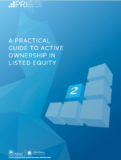
Bron
UN PRI
The Principles for Responsible Investment (PRI) has launched new guidance on active ownership, aligning to Principle 2 of the PRI, which encourages PRI signatories to be active owners and incorporate ESG issues into their ownership policies and practices, including engagement with companies and exercise of voting rights.
Active ownership is one of the fastest-growing responsible investment strategies in listed equity globally. But, while investors have been active owners for many years, little is known about current leading practices, processes and success across markets. More guidance on how to make active ownership an effective tool to support long-term value creation is needed. This guide intends to fill this gap and provide practical suggestions to those investors interested in building a fruitful dialogue with investee companies.
This report outlines concrete steps to make active ownership an effective tool to support long-term value creation in listed equity investing. Asset owners outsourcing activities, partially or entirely, can use this guidance to define their expectations, select third parties and monitor their activities. Investors at the beginning of this journey will not be in a position to cover in detail all areas presented in this guidance. However, they can use the recommendations and examples to set the direction of their active ownership programme and become future leaders.
While this guidance focuses on practices related to listed equity holdings, several insights and recommendations on policy development, execution and disclosure can be equally applied to other asset classes such as corporate fixed income and private equity. Further in-depth analysis of the differences and engagement implications in fixed income is included in the forthcoming PRI publication, ESG engagement for fixed income investors: managing risks, enhancing returns.
“Active ownership is generally regarded as one of the most effective mechanisms to reduce risks, maximise returns and have a positive impact on society and the environment – for passive and active investors,” said Kris Douma, director of investment practices and engagements.
“Recent academic research also demonstrates that active ownership, when done well, can result in higher financial returns, enhanced communication, improved knowledge, stronger internal relationships and more integrated strategies. We hope this guidance will provide useful best practices for institutional investors.”
The PRI Blueprint agenda for the next decade, released last year, includes specific commitments to “foster a community of active owners” and “enable real-world impact aligned with the SDGs”. This guidance is a fundamental step to deliver on the first area, while more work on the relationship between active ownership and the SDGs agenda will follow later in 2018.



